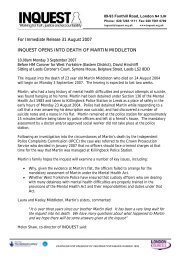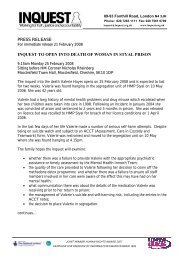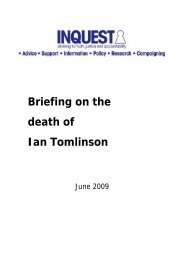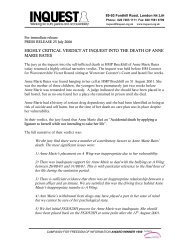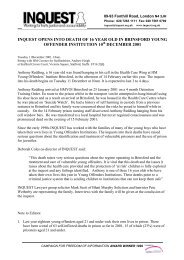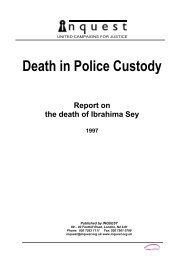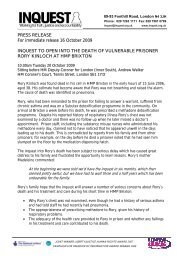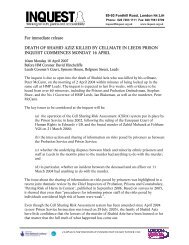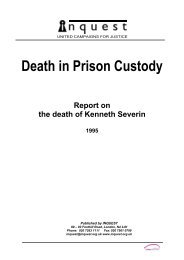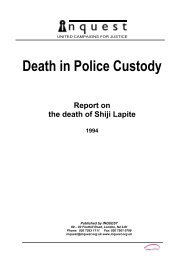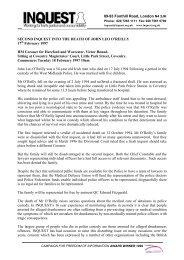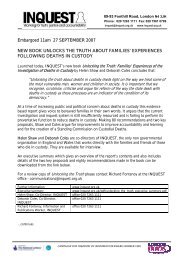Rocky Bennett Briefing - Inquest
Rocky Bennett Briefing - Inquest
Rocky Bennett Briefing - Inquest
Create successful ePaper yourself
Turn your PDF publications into a flip-book with our unique Google optimized e-Paper software.
Treatment and Responsibility<strong>Rocky</strong>’s sister, Dr Joanna <strong>Bennett</strong>, is herself a mental health professional and describes <strong>Rocky</strong>’streatment as having no focus [on his recovery] instead just treating him as though he wasdangerous and violent. She goes further to say that there is little or no evidence of anytherapeutic intervention to help <strong>Rocky</strong>’s progress in his will to manage his illness. She states thiswith some authority after spending many hours on the phone to his primary nurse in an effort toestablish what kind of care and treatment package her brother was being given. She was toldnothing apart from the fact that he was still symptomatic. This has implications in <strong>Rocky</strong>’s casebecause the only indication he had ever been given of his discharge was when he becamesymptom free. <strong>Rocky</strong> had been in the psychiatric system since 1980. He was very frustrated.The family feels that the patients and those in psychiatric care take a very much subordinateposition to the protection the institutions give themselves and their staff. Rather than theinstitution taking responsibility for <strong>Rocky</strong>’s death, his sister believes that those individual nursesresponsible for caring for <strong>Rocky</strong> should be held accountable. After that accountability is definedthen the professional bodies must be questioned about their training and policies that have leadto the death of one too many patients.Nurses involved in an incident such as that preceding the death of <strong>Rocky</strong> <strong>Bennett</strong> should not beable to continue to practise whilst an investigation is in progress. The NHS cannot continue totalk about good practice if as an institution it continues to defend nurses whose actions in suchcircumstance result in a death.Families’ motivation following a death is to find out the truth, including a full explanation fromofficial sources to prevent it happening again, to obtain an apology and an acknowledgement ofwrong doing or blameworthiness if found and for those responsible to be brought to account fortheir actions.Restraint of Black People – The IssuesSince the early 1990s INQUEST has monitored a disturbing pattern of deaths in custodyfollowing the excessive use of force by police officers. There have also been a number of deathsfollowing medical neglect. The disproportionate number of individuals, particularly Africans andAfrican-Caribbeans, dying in the aftermath of the use of force has reinforced the idea that manyof these deaths are a reflection of racism within institutions and that black people are amongstthose singled out for potentially lethal restraint. We call upon the governing bodies to create andenforce policies that will ensure the protection of those patients who are in psychiatric care toprove once and for all that racially motivated abuse such as this is not tacitly condoned at everylevel.Many of these cases have presented disturbing images of violence and racism – ascribing toblack people stereotypical characteristics of extraordinary strength and dangerousness,attempting to blame the victim for their own death either by their pathological condition or theirpersonal choice.Another group over represented are the mentally ill where ‘negative imagery’ once again informstheir treatment - the stereotype of the mentally ill as ‘mad’, ‘bad’ and ‘dangerous’.It would only serve to encourage public confidence if custodial institutions were seen to inviteand welcome public scrutiny of their actions in order that lessons are learnt and furthertragedies prevented.



